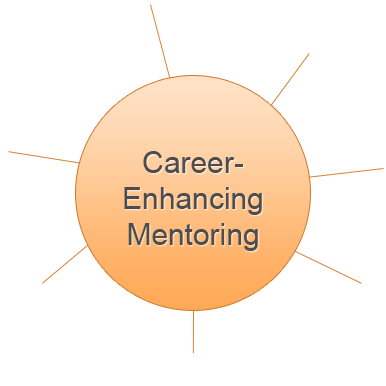Career-Enhancing Mentoring
In the career-enhancing function, mentors are focused on the external performance of mentees, specifically their professional and intellectual development. Click on the boxes below to learn more about some of the career-enhancing roles of research mentors.

Support the Research Process
The depth and breadth of research-specific mentoring that you provide should be tailored to a mentee’s training stage, existing knowledge and skills, and confidence level. New graduate students are likely to need more input on their projects. Advanced fellows and new research-intensive faculty may be technically proficient in research but need your assistance with other critical tasks such as:
- Assessing and communicating the significance of their research ideas
- Identifying funding sources for their research
- Nurturing collaborations
- Working effectively with research support personnel
- Accessing core facilities and resources in the institution
- Hiring and supervising staff, managing research teams
“My mentor connected me with other faculty and encouraged us to share personnel when the required skill sets were similar. This kind of creative thinking makes it so much easier for me to focus on the science, knowing that I have help with the operational logistics of launching my projects.”
— Mentee
Enhance Teaching Practices
Most researchers in academic settings are also teachers, advisers, and mentors. Your mentees may need to demonstrate excellence in teaching and other educational activities in order to secure their first academic position and advance in their careers. You can attend to this important area of their professional development in a number of ways. Click on each tab below for examples that apply to different types of mentees.
1. For a junior faculty mentee with teaching responsibilities, mentors can …
- Be a sounding board and offer advice when challenges arise in the classroom
- Assist mentees with developing and maintaining a teaching portfolio
- Share their strategies for effectively mentoring students and fellows
- Offer insight on how teaching is valued and rewarded in the institution, including how this work is evaluated in the promotions process
2. For mentees who need help balancing their time in teaching and research, mentors can …
- Identify and advocate for time-balancing strategies such as: teaching in blocks (one semester on, one semester off), maximizing research productivity during teaching down-time (semester breaks, summer), and carrying reduced teaching loads during critical research ramp-up periods
- Offer advice on efficient use of support staff, teaching assistants, and collaborators
- Identify ways to make teaching and research more synergistic
3. For mentees who either lack teaching experience or want to become more effective teachers, mentors can …
- Offer mentees a role in teaching: guest lecturer or co-instructor for a course, preceptor for a clerkship, or facilitator for small groups or learning circles
- Review drafts of curricula, syllabi, teaching materials, learner assessment tools; share copies of their own
- Observe and provide feedback on teaching
- Identify relevant professional development offerings in one’s institution, at professional meetings, or online such as Webinars or self-paced tutorials.
Develop Career Management Skills
For new faculty, an important and often untaught skill is the ability to effectively manage one’s own career. In contrast to other professional settings where promotion mechanisms are either automatic (based on years of service) or selective (by invitation), faculty in higher education need to be more proactive in learning about promotion criteria and assessing how well their work aligns with these.
Graduate students and fellows, too, can benefit when mentors support them as they consider questions such as: What will I do after this phase of training? How do I know if a certain job or work environment is a good fit for me? What else could I be doing now to learn more about and prepare for that next step?
You can use individual development plans (IDPs) as a tool for encouraging mentees to reflect on their training and career pathways.
“Sometimes every item on the ‘to do list’ seems equally important. Mentors can help us realize which items should be prioritized — especially the ones that will directly help us reach our own goals.”
— Mentee
Identify Opportunities for Development
One reason mentoring is so influential is that it can be tailored to match a mentee’s unique needs. Early-stage investigators differ in their backgrounds, abilities, and career goals. The challenge for mentors and their mentees is to collaboratively identify specific gaps in training, then consider potential strategies to support the mentee’s development, keeping in mind the type of researcher each mentee aspires to be.
One way to do this is to ask your mentees to complete a self-assessment tool. Some examples are provided in the Resources and References tab for this module. Discuss the assessment findings together, with the aim of generating ideas for how your mentee could acquire or improve the desired skills or knowledge, for example:
- Complete an advanced statistical analysis course
- Attend a specialized conference in the field
- Join you in meetings with collaborators
- Hold a practice session for an upcoming presentation.
Listen to Esam El-Fakahany describe some of the “soft skills” that aren’t often taught to early-stage investigators, areas in which mentees might need additional “development.”
Be an Advocate, Offer Protection
Mentees will face a variety of challenges during their research training and careers. In some situations, a mentor’s most valuable role is helping advocate for and protect their mentees. For example, graduate students with more limited skills in the dominant language of a research team might be excluded from important conversations. You could be an advocate by publicly showcasing these students’ skills or data during a team meeting, then facilitating a group discussion.
As another example, junior faculty members from under-represented minority (URM) groups are often pressed to take on too many URM mentees or serve on too many committees that need diverse membership. You could play a protective role by helping your mentees weigh the value of each new proposed activity and offer advice on how to gracefully decline invitations that are not a good fit.
“As a graduate student, I faced some tensions with other, more experienced colleagues and collaborating clinicians on the team. After I voiced my concerns, my mentors talked with those colleagues to make sure my role was respected. With the help of my mentors I could peacefully finish my project and stand my ground in some ambiguous situations.”
— Mentee
Foster Independence
A critical outcome of successful research mentoring relationships is that mentees become independent. Although the concept of independence can seem straightforward, the practicalities can be more complex. What milestones of independence are mentees expected to reach? How (if at all) do mentors communicate those milestones to mentees? What strategies can a mentor use to successfully foster independence in mentees? How can a mentor determine what level of independence is appropriate for each mentee?
Answers to these questions depend on many factors, such as a mentee’s training level and career goals, the duration of the mentoring relationship, and a mentor’s work style.
Complete Activity 1 (next tab) to explore how you can foster a mentee’s independence.
“I think what lured me into science was the amount of independence I had, even during my undergraduate research. During graduate school, I was left alone to handle everyday aspects of the research, with time to discuss only big questions with my mentors. This was a jump into deep water, but pushed me to stand up for my ideas and decisions. It’s great to have mentors who can see where you are skillwise, and let you take some risks.”
— Mentee
Broker Opportunities
A broker functions as an intermediary between two or more parties in negotiating agreements. In research mentoring relationships, mentors can broker valuable opportunities for their mentees that give them recognition and support their professional growth. For example, you might recommend mentees as content reviewers for journals or grant funding programs, engage them in national working groups or committees, or nominate them for awards. Brokering can be proactive (done routinely to keep the mentee on a successful trajectory) or reactive (done to overcome a particular challenge).
“My mentor recently passed along an opportunity to join a writing committee in a leading professional organization that will inform national guidelines on hypertension. She also offered to mentor me throughout this process so that I can make a meaningful contribution.”
— Mentee


